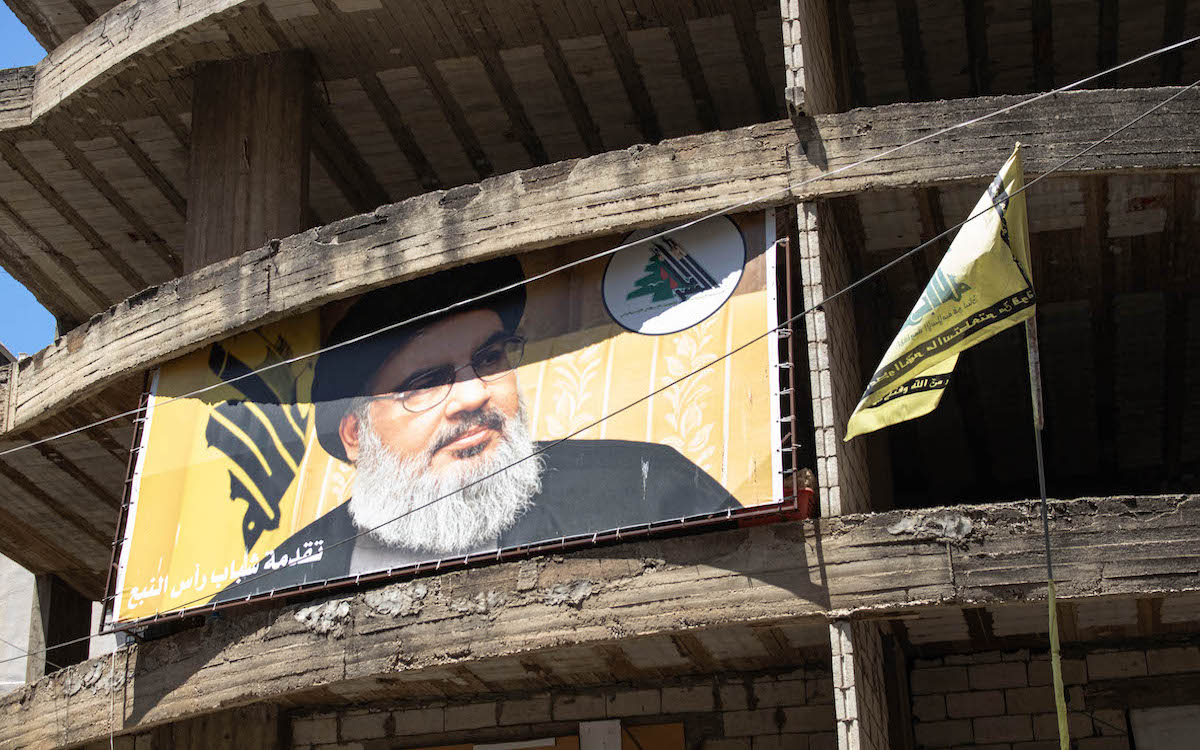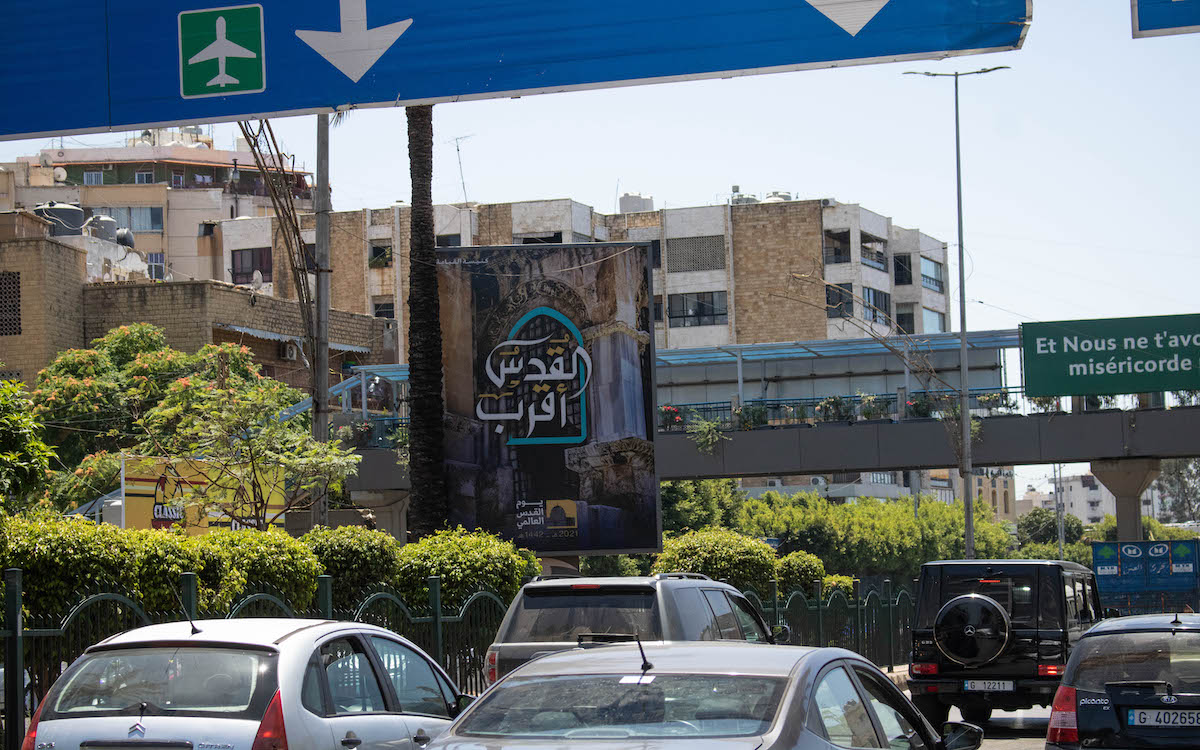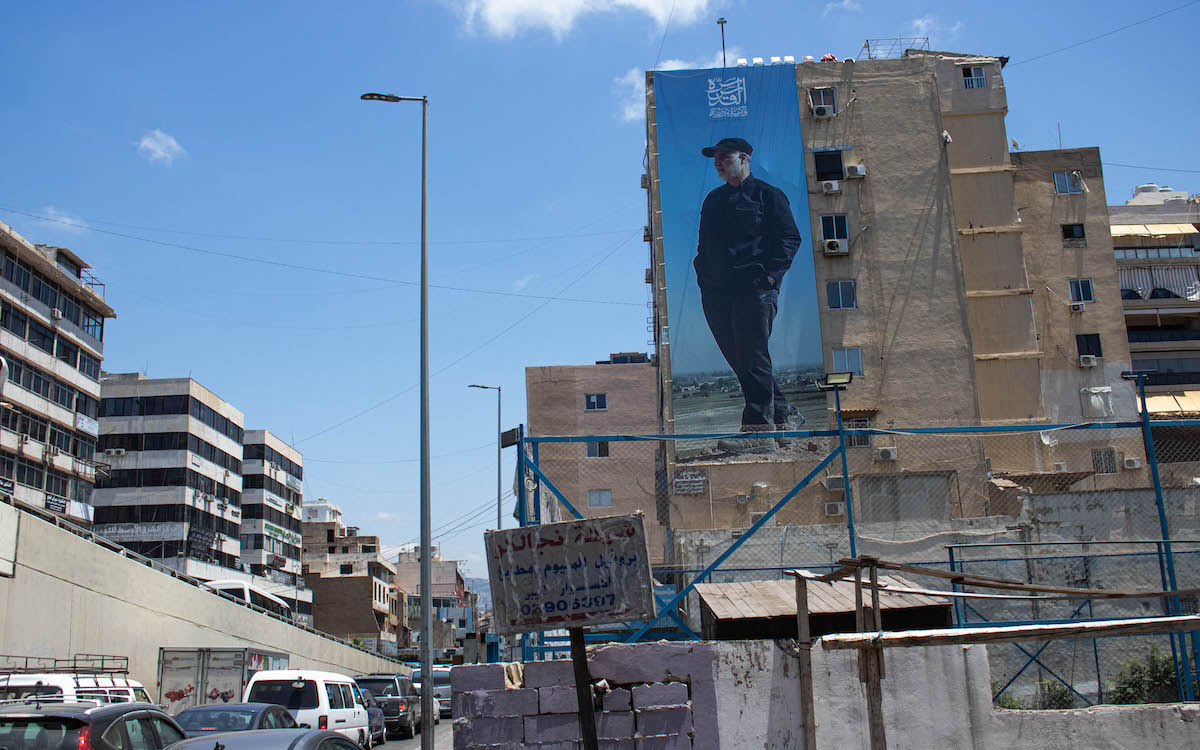
Missiles flew harmlessly into farmland and the Mediterranean Sea in Northern Israel after being fired from a field in Southern Lebanon.
The three missiles were not fired by Hezbollah, who controls the territory in Lebanon’s South. Rather, by Palestinian militants in a show of solidarity with their comrades who were being bombarded by Israeli bombs in Gaza at the time.
“Any military actions that are taken in Lebanon cannot happen without the approval of Hezbollah,” Ali al-Amine, founder of the online news outlet Janoubia, told NOW. “There isn’t a Palestinian group that can override Hezbollah’s decision. They can’t fire any missiles from Lebanon without first getting approval from Hezbollah.”
While Hezbollah may have given its blessing to the militants to fire the missiles, the Shiite group had done little else to show its support for the Palestinians fighting against Israel in the West Bank, Gaza Strip and Jerusalem outside of statements made by the group’s Secretary-General Sayyed Hassan Nasrallah.
“Attacking Jerusalem could lead to a regional war,” Nasrallah said in his televised address for the 21st anniversary of Israel’s withdrawal from Lebanon. “The Axis of Resistance cannot and will not sit still at the sight of threatening our sanctities. Any serious threat will lead to a war against the Zionist entity which will lead to its demise and remove it from existence.”
Although the group has continued to make symbolic gestures to Palestinians and groups like Hamas, such as the installation of a monument in Haret Hreik, a Hezbollah-dominated area of Beirut’s southern suburbs, they have made little effort to fulfill their promise to “liberate Jerusalem” from Israel.
Instead, Hezbollah has been putting more focus and effort on consolidating its power inside Lebanon as the country slips further and further into political and economic crises.
The Palestinian cause
For decades, Hezbollah has touted its support for the liberation of Palestine from under Israeli occupation. With the withdrawal of the Israeli occupation from South Lebanon in 2000, the group showed the world that it was a formidable military organization.
Since then, however, Hezbollah has focused primarily on its work inside Lebanon, as well as on fighting in support of Syrian President Bashar al-Assad during the civil war, with little action being taken to support the Palestinian cause that the group has long touted. Hezbollah’s Deputy Secretary-General Naim Qassem, in an interview with Al-Nour Radio on May 22, insisted that Hezbollah was doing everything that it could to support the Palestinians.
“We in Hezbollah were following daily events in Palestine, in daily contact with [Palestinian] resistance commanders and the mujahidin,” Qassem stated. “Hezbollah supports the Palestinian resistance with all means. ‘What we have to do, we will do at the right time, and determine [what to give].'”
According to Kassem Kassir, a Beirut-based political analyst who follows Hezbollah’s development, the Palestinian cause is still something that is deeply important to the group, but military intervention by Hezbollah would require external factors.
“Palestine is not just a Palestinian cause. It is an Arab cause, an Islamic cause and a humanitarian one as well,” the analyst told NOW. “Hezbollah used to always hold the banner “‘Fight! Fight! Fight until we get to Jerusalem.’ However, they lately stayed within the Lebanese borders, but they still support Palestine.”
However, not everyone agrees that Hezbollah is truly behind Palestine.
Hilal Khashan, a professor of political science at the American University of Beirut, argues that Hezbollah’s support for Palestine is merely rhetoric in order to help give Iran more legitimacy in the region.
“It was always rhetoric,” Khashan told NOW.
“Iran took advantage of the Palestine question because, by then, it became clear in 1982 that the Arabs had abandoned the Palestine question especially after each had signed the Camp David Accords in 1978. Here, the Iranians became the champions of the Palestinians and the need to liberate Jerusalem.”
The professor added that the creation of Hezbollah in the 1980s and Israel’s eventual withdrawal from Lebanon in 2000 better positioned Iran to be a major player in the region and to further expand its influence.
Al-Amine agreed that the Palestinian struggle is an important topic in the region and added that no matter what Hezbollah does, it will use the liberation of Palestine and Jerusalem as an excuse.
“Hezbollah knows that Arab society, in Lebanon and the Arab world, that the subject of Palestine and Jerusalem is a sensitive one,” al-Amine said. “Even if Hezbollah is fighting in Syria and fights Syrians, they say that their fighting in Syria and the fighting against Syrians will help liberate Jerusalem.”
Hezbollah has also long pushed the notion of unity between the various militant groups in the region, claiming a united front against Israel and Western intervention in the region.
After the start of the Syrian civil war, this unity came under question when Hamas pulled its officials from its headquarters in Damascus and moved them to Cairo and Doha at the start of 2012.
Soon after Hamas left Syria, Ismail Haniya, the head of Hamas in Gaza, threw his support behind the Syrian revolutionaries fighting to oust Assad.
“I salute all people of the Arab Spring, or Islamic Winter, and I salute the heroic people of Syria who are striving for freedom, democracy and reform,” Haniya said in a speech at a Cairo mosque.
While the group stated that they left due to the increase in fighting, there has been speculation that the reason for Hamas backing the revolution is due to the Syrian regime’s bombings in the Yarmouk Palestinian refugee camp.
The fighting in Yarmouk began in 2012, the same time that the political leader of Hamas, Khaled Mashal began spending more time outside of Syria.
This division is disputed by Qassem, who says that such fighting never existed and that differences in opinion “created friction” but never broke up the alliance.
“At no point was there Sunni-Shiite strife inside the Axis of Resistance, between its factions,” Qassem stated in the same interview with al-Nour Radio. “The issue of Syria in 2011, led some in the Axis of resistance, particularly Palestinians, to take positions inconsistent with the rest of the Axis.”
This notion of a unified front was supported by Kassir who said that the war in Syria did not drive a wedge between Hezbollah and Hamas.
“There are good relations [between Hezbollah and Hamas] and there is constant coordination and cooperation and continuous meetings in all stages,” Kassir said. “The dispute over Syria did not affect their relationship.”
Khashan agreed that Hezbollah and Hamas are united in their campaign against Israel, but added that that is where the relationship ends since the two groups are ideologically opposed.
“Hezbollah is a Shia movement that subscribes to Wilayat al-Faqih (subservience to the Supreme Leader of Iran). Hamas is a Sunni movement that originated from the Muslim Brotherhood,” Khashan explained. “Ideologically, the two movements can never come together. Their alliance is tactical. They have different visions for the region and for the conflict with Israel.”
On top of that, Khashan argued that Hezbollah has no interest in fighting with Israel now and is more focused on maintaining its position in Lebanese politics.
“Just imagine what would happen if Hezbollah and Israel would go to war. The achievements of Hezbollah and Lebanese Shia would go down the drain,” he said.
“Hezbollah does not want to lose its preeminence in Lebanese politics. To maintain its preeminence means avoiding war.”

Armed Iranian proxy
Hezbollah continues to maintain a military force under the pretext of resisting Israeli aggression, but after the 2000 Israeli withdrawal, the group has only fought a month-long war with Israel in July 2006, as well as sent troops across the border to Syria to support the Assad regime after 2011.
Following Israel’s pullout of Lebanon in 2000, Hezbollah was widely viewed as a liberating force but that reputation was quickly tarnished in 2006 when the militant wing of Hezbollah kidnapped and killed two Israeli soldiers, sparking a war between the militant group and Israel, resulting in the Israeli slaughter of over 1,000 Lebanese and the displacement of an estimated one million more.
While Hezbollah declared victory after a ceasefire was brokered, their image was no longer as the liberator for many Lebanese and had shifted, according to Khashan, to that of an Iranian occupation force in Lebanon.
This was an important lesson for Hezbollah’s leadership – they have been careful to avoid a war with Israel ever since.
“They acknowledge that if they have a war with Israel, then they will not continue to be the ones in power in Lebanon,” al-Amine stated. “They don’t want that because taking that action will lead to a big war and no one in Lebanon would stand with Hezbollah if there was a war with Israel, especially if they were the ones who started it.”
Instead of provoking Israel, Hezbollah has adjusted its focus on consolidating power in the Lebanese political and social spheres.
Hezbollah’s infrastructure being constructed essentially as a state within a state allows them to continue to expand their influence in the country while the Lebanese government continues to weaken.
“I believe that, in the future, the economic, social and political collapse will reflect on Hezbollah,” al-Amine explained. “Hezbollah can’t continue if the government is ending. They need a weak government.”
Khashan agreed that Hezbollah has been able to use the worsening economic crisis and the inability of the political establishment to take any effective actions to their favor.
“In recent months, in response to the frightening economic crisis and the loss of the value of the Lebanese currency, Hezbollah started a welfare system to provide food necessities to impoverished Shia,” he said.
Al-Amine argued that Hezbollah significantly benefits from a weakened state and that they will not intervene in a nationwide crisis as they will insulate themselves so that they are not as affected.
“Hezbollah will always need instability in the government,” he stated. “The Lebanese state cannot continue like this. Hezbollah doesn’t care about the situation because they take steps to stop the collapse [from affecting them].”
Hezbollah has often been blamed for the failures of the Lebanese government, but Kassir and Khashan both agree that the failures that exist in Lebanese politics are systemic rather than just Hezbollah’s fault, including the lack of support from the West.
“The problem is the political situation in Lebanon as a whole and its failure,” Kassir said. “The West doesn’t trust Lebanon because of the government’s constant failure, their inability to call for a government formation and social reforms and it’s not only Hezbollah’s fault.”
“Lebanon was created to be unstable and Lebanese instability doesn’t really need Hezbollah. Even without Hezbollah, Lebanon would be unstable,” Khashan added.
However, Khashan did not absolve Hezbollah for everything, saying that the group helped to “exacerbate” the situation by being a “super political actor.”
He explained that throughout Lebanon’s history when a “super political actor”, or an individual or group that wields a large amount of influence and power that can almost surpass the state in influence, emerges, the system is quick to snuff it out. An example, he said, is the rise and assassination of former Lebanese Prime Minister Rafik Hariri.
“Hezbollah also presented itself as a very super political actor, except that there is no local power that is capable of containing it,” Khashan stated. “This is Lebanon’s predicament. The presence of a super political, military actor that the country cannot deal with.”
Hezbollah backers are quick to support the group’s role in Lebanese politics which they view as a way to prevent Western dominance in Lebanon through its ability to tip the balance of power in favor of their parliamentary bloc.
“An important role [of Hezbollah in Lebanese politics] is to not leave the [parliamentary] blocs of the American Embassy to be the only ones making decisions, opinions and deciding the country’s politics,” Ali, a Hezbollah supporter who spoke with NOW on the condition of anonymity, said.
The fact that Hezbollah maintains an active military force has led some, like al-Amine, to argue that the group is not really a political party but, rather, “more of a military force than it is a political one.”
“[The situation in Lebanon] can only change if Hezbollah changes its politics and say that they are a Lebanese political party,” al-Amine stated. “[Hezbollah] needs to decide if it wants to be a political party, a military party or an ideological party.”
Kassir disagrees that Hezbollah needs to give up its weapons, however, saying that there is still Israeli aggression and that the Lebanese military is ill-equipped at stopping them.
“It’s a problem to have plural forces that defend Lebanon and it’s important to find a solution to that,” Kassir said. “So we can’t ask Hezbollah to eradicate the Resistance while Israel still exists but we need to find a way to make a joint force.”
Ali agreed that Hezbollah’s military wing plays an important role in defending Lebanon from would-be attackers.
“I see Hezbollah as the most honorable resistance on Earth,” the enthusiast stated. “The role of Hezbollah is a key player in protecting Lebanon from its enemies.”
But despite Israel’s constant violation of Lebanon’s sovereignty by having drones and planes fly over the country, Khashan says that “the resistance” is no longer needed as Israel has very little interest in Lebanon.
“Israel has no interest in Lebanon,” he explained. “Israel’s interests are in the West Bank and the Golan Heights. There is no real fixation on Southern Lebanon.”
While opposition and efforts have been made to put limits on Hezbollah, al-Amine explained that it is hard to accomplish this since the party is present in all facets of Lebanese politics, allowing them to block any attempts to crack down on them.
“There are ministers in parliament who are protecting Hezbollah’s interests,” al-Amine said. “They are in the parliament, they are in the government and they are in organizations. So Hezbollah is present in all aspects of political life.”
Tempering Hezbollah’s role in Lebanese politics would require the Shiite community to vote for alternative parties so that Hezbollah has fewer seats in Parliament.
The Shiite, however, are not going to easily vote Hezbollah out of office anytime soon.

Questions over future leadership
For well over two decades, Hassan Nasrallah has led Hezbollah.
But in his May 25 address, concerns over his health spread throughout Lebanon, particularly in the southern suburbs, when the group’s leader appeared breathless and coughed throughout his speech.
The party is more than prepared for the eventual passing of the group’s 60-year-old leader according to Kassir.
“There is an internal structure within Hezbollah,” Kassir stated. “There are many individuals who could be viable for this position but it’s all up to the cause. The Shura Council would decide on someone new for the Secretary-General position.”
For many in Lebanon and throughout the region, a Hezbollah headed by someone other than Nasrallah is hard to imagine but with Hezbollah’s infamous organization, they would unlikely face an internal power struggle or see its role decrease in Lebanon. The Shiite would also be unlikely to abandon the party even after Nasrallah’s passing.
While Hezbollah is a controversial group in Lebanon, analysts agree that the party is not going anywhere.
During the popular uprising of October 17, 2019, Lebanese from all sects and backgrounds filled the streets for months to call for the ruling political parties to step down and for the sectarian system to be reformed.
In the first few days of the protests, Shiites throughout the country took part, but their opposition was quickly shut down by Hezbollah and its companion Shiite party, the Amal Movement.
“There was opposition within the Shiite community to the system and they wanted the introduction of a ‘secular political system,'” Khashan said. “After that, Hezbollah started to clamp down on Shia taking part in the protests.”

Internal dissent vs. “survival necessity”
Walking through Beirut’s southern suburbs and in South Lebanon, it appears that the entire Shiite population supports Hezbollah and the Amal Movement. However, there is a significant portion of the community that opposes them and is unhappy with the parties.
According to Khashan, the Shiite community views Hezbollah as their best chance at survival and at maintaining a significant role in Lebanese politics and, without a viable alternative, this is unlikely to change.
“I would argue that many Shia may be unhappy about Hezbollah but they all understand that the failure of Hezbollah means the failure of the entire Shia community,” he explained.
“It doesn’t really matter if they like Hezbollah or not. Supporting Hezbollah has become a survival necessity.”
Many of the traditional parties are facing opposition in the upcoming 2022 parliamentary elections by new opposition parties that formed from the cries for change during the uprising, but there is little chance that the parties will be able to convince a large majority Shiite voters that they can better represent the community than Hezbollah.
“Nothing will happen,” Khashan said of the Shiite vote in the 2022 elections.
According to Khashan, after it entered Lebanon’s political arena, Hezbollah has become a kingmaker, choosing who becomes president such as with Michel Aoun in 2016, and forcing a government to resign, such as when the five Shiite members of Fouad Siniora’s government resigned in an attempt to topple the government after the Special Tribunal for Lebanon was established in the wake of Rafik Hariri’s assassination.
More recently, they have often been the ones to decide who will lead a government, making sure that it will always fit the party’s needs.
Al-Amine says that Hezbollah will continue to take its marching orders from Iran.
“If Iran told them to go and start a war today in south Lebanon, then they would start a war in south Lebanon,” he said.
The same goes for Hezbollah’s dual identity as a political party and a military force. They will continue to be involved in all aspects of Lebanese politics all the while maintaining and expanding its military capabilities until Iran tells them otherwise.
As long as the Lebanese state refuses to come down on Hezbollah and put limits on them, the group will continue to gain strength as the state weakens, Al Amine concluded.
Nicholas Frakes is a multimedia journalist with @NOW_leb. He tweets @nicfrakesjourno.








